Whaling and Sealing in South Georgia: The Aftermath
Can island wildlife decimated by hunting and invasive rodents be reclaimed? If so, South Georgia in the Antarctic Polar region may be a model.
Captain James Cook is on record as being the first person to have actually set foot on South Georgia island (1775). Although there are reports of earlier sightings, Cook has the distinction of being the first voyager to disembark and walk around. He encountered the island on his second voyage (navigating on The Resolution), and spent three days there. He surveyed it and mapped it. After that, he claimed the land for England, named it after King George, and declared the bleak place was "not worth discovering." He was certain it would bring no value to anyone.
South Georgia Pintail Duck, Endemic to the Island
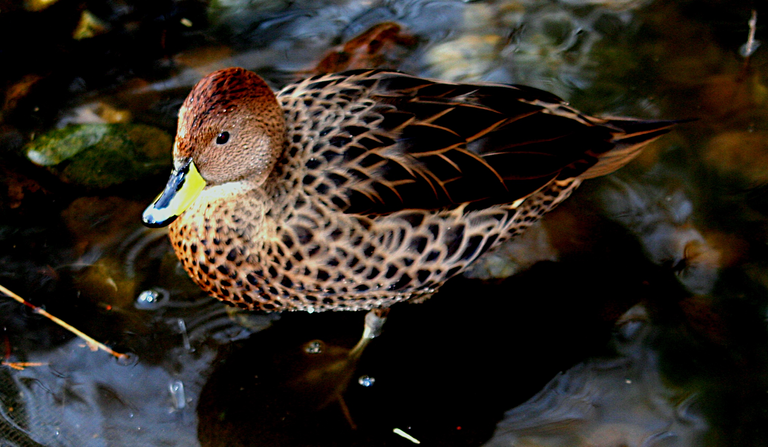
Credit: Sabine's Sunbird at English Wikipedia. Used under CC 3.0 license . When Captain Cook surveyed South Georgia, this is one of the animals he reported seeing.
Cook's report of seeing seals on the island belied his belief that the place would have no value. The report attracted the attention of sealers. Thirteen years after Cook dismissed the worth of South Georgia, the first seal hunter arrived on the island's shores. The seal industry took hold. It is estimated that between 1825 and 1912, 1.2 million seals were slaughtered in the industry's appetite for all things seal, including fur and oil. According to the PEW Charitable Trust, by that time the species was almost wiped out.
As the seal slaughter was depleting the species, another commercial enterprise was taking hold. In 1904 the first whaling station was established in the settlement of Grytviken on South Georgia. Between 1904 and 1965 that community saw an estimated 175,250 whales slaughtered.
The first whale species to be hunted on south Georgia were humpbacks. When this pool of marine mammals was exhausted, hunters moved further out to sea and pursued the blue whale.
Bluewhale Blowing
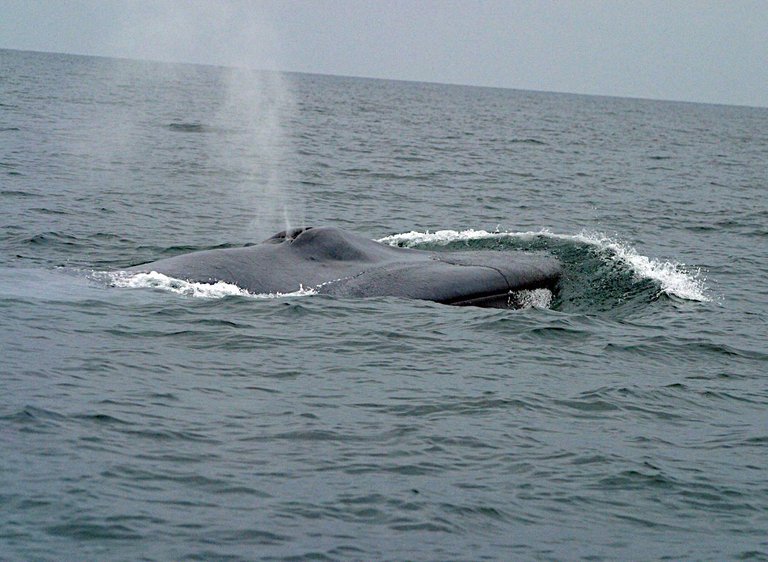
Credit: NOAA. Public domain.
Between 1904 and 1971, an estimated 42,698 blue whales were slaughtered in the waters off South Georgia. Blue whales were driven to near extinction there.
In 1965, the last blue whale was caught and slaughtered in South Georgia. While it is true that the decimation of whale and seal populations had a profound effect on the ecology of South Georgia, there were also other detriments to the ecology caused by human presence on the island.
Non-native plant species were introduced. Today, it is believed that 41 non-native species exist on South Georgia and that these threaten indigenous flora.
Reindeer were introduced (for the whalers to hunt!). But an even more destructive species was brought to South Georgia on whaling ships: rodents. The Norwegian brown rat, and mice, stowed away on the whalers. The rodents quickly adapted and found a rich food source in the eggs and chicks of ground-nesting birds.
Blue Petrel
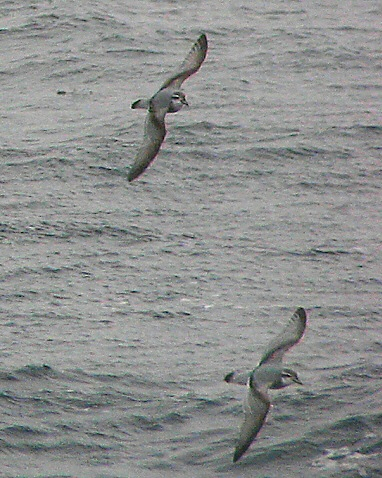
Credit: GeSHaFish. Used under a CC 3.0 license. These blue petrels were photographed in Antarctica. Because of rat predation, the blue petrel had stopped nesting in South Georgia.
Some areas of the island remained free from rat infestation because glaciers served as barriers. But, with global warming and the melting of glaciers, even those areas were threatened. Several bird species stopped coming to the island to breed.

Restoration of South Georgia
Reclaiming the natural habitat of South Georgia demanded a multi-pronged approach.
In 2012 the GSGSS, Government of South Georgia and South Sandwich Islands, established a Marine Protected Area around South Georgia.
A February 2020 survey of the waters revealed 58 blue whale sightings and 'numerous acoustic detections'. Blue whale recovery is taking longer than expected. One marine biologist suggests that so many whales were killed off that the species has lost 'cultural memory' of the waters as breeding grounds. This will take time to reestablish.
Humpback Whale and Calf
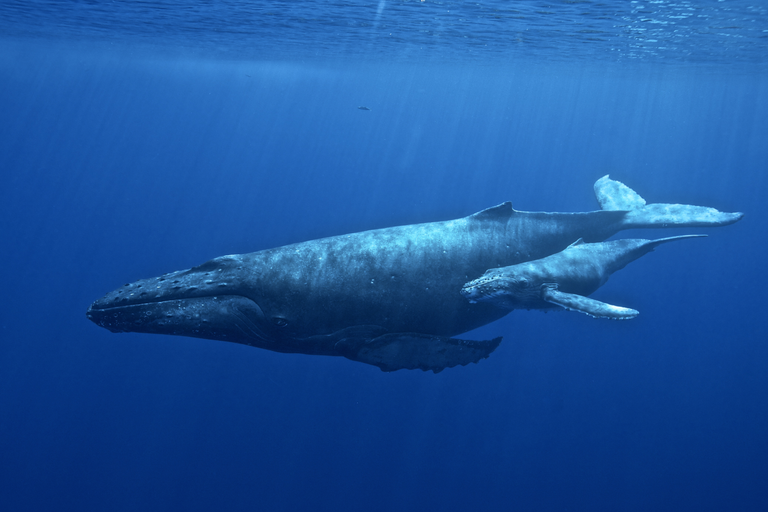
Credit: National Marine Santuaries. Public domain.
Humpback whales are showing stronger recovery. According to a survey conducted in 2019, the whales had returned to about 93% of their 'pre-exploitation' levels.

In 2011 the SGHT, South Georgia Heritage Trust, began a rat eradication program. It took several years for the Trust to drop approximately 300 metric tons of rat bait on the island. In 2013 and 2015 the organization repeated the drops. Subsequent surveys of the island (including the use of rat-sniffing dogs) have turned up no evidence of rodents. Monitoring will continue, however, on an ongoing basis.
South Georgia Pipit
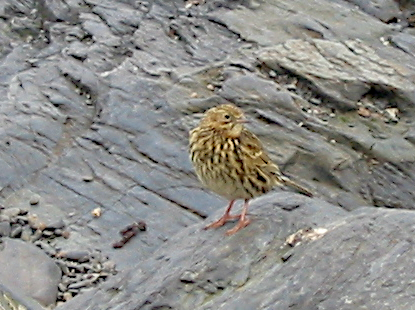
Credit: Ben Phalan, British Antarctic Survey. Used under CC 3.0 license.. The pipit breeds in tussock grassland. Previously, the bird was severely threatened by rodents because of its nesting habits.

In 2013 eradication of the reindeer began. A few of the reindeer were relocated. The rest were killed. Over several years of (humane??) slaughter, about 6,750 reindeer were slaughtered either by hunters or by other 'euthanistic' measures. In many cases, the meat was salvaged and sent abroad.
Reindeer on South Georgia Island Before Extermination
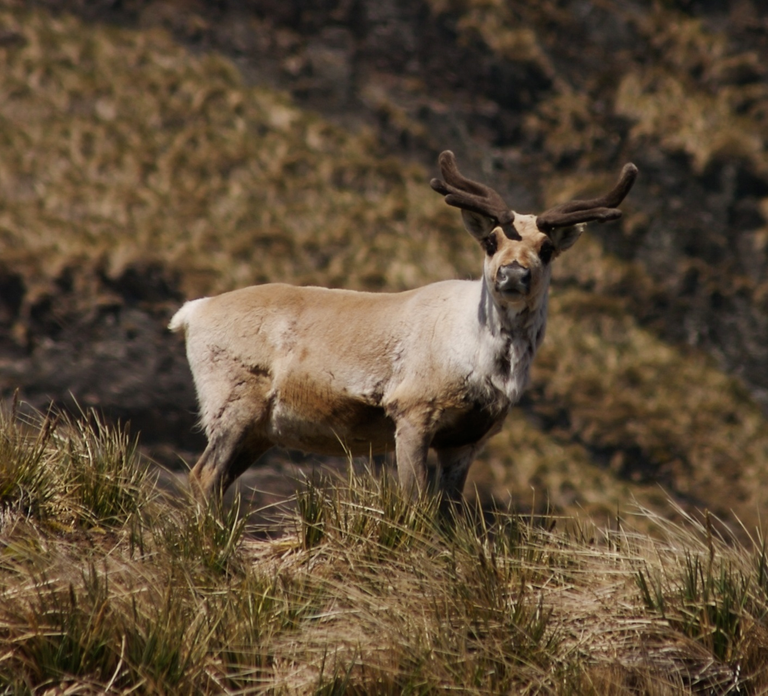
Attribution: Sydpolen at English Wikipedia. Used under CC 1.2 license.
Despite the extermination of reindeer from the island, South Georgia still sports a reindeer on its coat of arms.
Northern Giant Petrel (Macronectes halli), South Georgia
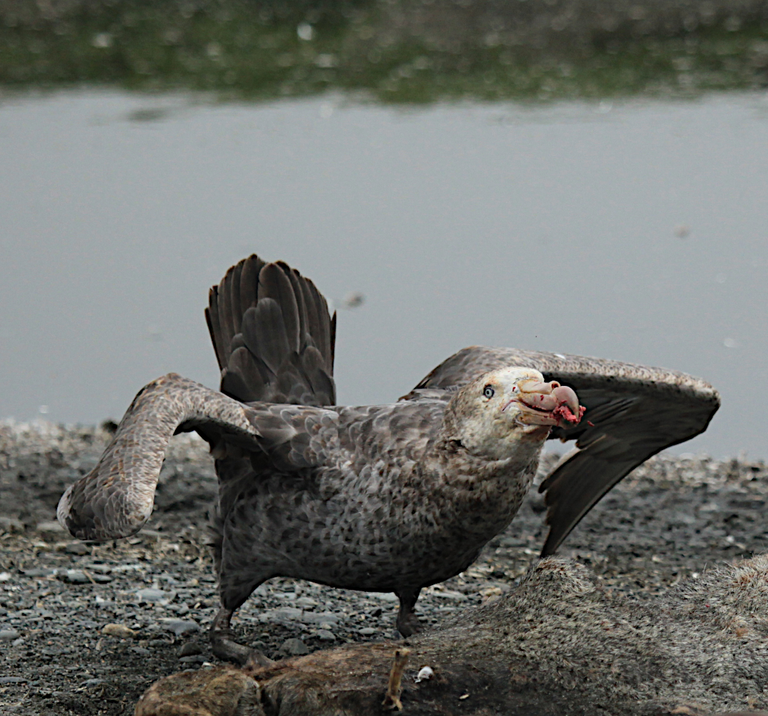
Credit: Liam Quinn from Canada. Used under CC 2.0 generic license. This aggressive omnivore earned the nickname Stinker. This is due not only to it's vulture-like diet--it feeds on carcasses--but also to its predilection for vomiting on anyone or anything it chooses. Its biogeographical realms are Antarctic, Australasian, Neotropical, Afrotropical, although the birds are most commonly found in South Georgia.

Conclusion
Is it possible to reclaim an ecology devastated by human action? Perhaps South Georgia is a model. However, certain circumstances on that island may render it unique. For one thing, it is an island, and therefore has certain natural barriers. For another, there are glaciers which form more barriers and helped to keep 'rat zones' separate. Finally, extreme measures were taken that might be not be politically viable in other circumstances. Killing almost 7000 reindeer might be unpalatable to some people.
This blog was inspired by a collage I made for the LMAC collage contest. I started reading about ground-nesting birds and came across the distinct challenges of South Georgia island.
Thank you for reading. I wish everyone, peace and health.
Postscript
The famous explorer Ernest Shackleton died aboard his boat Quest as it was anchored off the shore of South Georgia.

Accent Illustrations
- Shell
 @muelli from the LMAC, LIL, Image Library
@muelli from the LMAC, LIL, Image Library - Bird
 @yaziris from the LMAC, LIL, Image Library
@yaziris from the LMAC, LIL, Image Library
Selected Research Sources
https://www.smithsonianmag.com/smart-news/after-worlds-largest-rodent-eradication-effort-island-officially-rodent-free-180969039/
https://polarholidays.com/trips/falkland-islands-south-georgia-antarctica-15/
https://www.pbs.org/edens/southgeorgia/unique.html
https://www.pbs.org/edens/southgeorgia/unique.html
https://www.captcook-ne.co.uk/ccne/timeline/voyage2.htm
https://www.adventure-life.com/antarctica/south-georgia/articles/the-whalers-last-outpost
https://www.polartours.com/animals/south-georgia-pintail
https://www.pewtrusts.org/en/research-and-analysis/articles/2017/07/13/whaling-and-seal-hunting-defined-south-georgia-but-then-crashed
https://sght.org/sealing-archaeological-project/
https://www.int-res.com/articles/esr2020/43/n043p359.pdf
https://www.themarinediaries.com/tmd-blog/whale-of-fortune
https://deeply.thenewhumanitarian.org/oceans/community/2017/07/27/whales-seals-once-decimated-by-hunting-return-to-remote-islands
https://press.uchicago.edu/ucp/books/book/distributed/F/bo28561886.html
https://www.gov.gs/environment/eradication-projects/eradication-projectsreindeer/
https://sght.org/habitat-restoration/
https://www.cambridge.org/core/services/aop-cambridge-core/content/view/BC3E2CDA08575456EA235D0E92A41FB4/S003060531700028Xa.pdf/rodent-eradication-scaled-up-clearing-rats-and-mice-from-south-georgia.pdf
https://core.ac.uk/download/pdf/322534465.pdf
https://www.bas.ac.uk/project/building-data-resources-for-managing-the-south-georgia-south-sandwich-islands-marine-protected-area/
https://www.myvetcandy.com/newsblog/2020/11/19/blue-whales-return-to-south-georgia-after-near-extinction
https://www.sciencedirect.com/science/article/pii/S0967064522000595
https://www.science.org/content/article/rat-begone-record-eradication-effort-rids-sub-antarctic-island-invasive-rodents
https://www.atlasobscura.com/articles/how-to-exterminate-rats-on-an-island
https://www.oiseaux-birds.com/card-south-georgia-pipit.html
https://www.gov.gs/environment/eradication-projects/eradication-projectsreindeer/
http://datazone.birdlife.org/species/factsheet/northern-giant-petrel-macronectes-halli/text
https://www.coolantarctica.com/Antarctica%20fact%20file/wildlife/giant_petrels.php
https://www.arcgis.com/apps/View/index.html?appid=91f12145f2dc4ffc88509bcefb695326
https://animalia.bio/northern-giant-petrel
https://www.rmg.co.uk/stories/topics/shackletons-death-legacy
Very interesting and well researched blog. It's all about the money when it comes to killing those reindeer. I enjoyed reading about the history of a little known island.
Thank you so much, @pokerm. You are always so kind and make the most encouraging comments. The reindeer--a terrible story, isn't it? There surely was another way, perhaps less profitable. But we do have a responsibility to the animals. I agree with you 100%
Your content has been voted as a part of Encouragement program. Keep up the good work!
Use Ecency daily to boost your growth on platform!
Support Ecency
Vote for new Proposal
Delegate HP and earn more
Thank you, @ecency. I appreciate the support🌸
Fascinating as always. You invariably take me to places I'd never go alone.
I had a feeling it was the ground-nesting birds that inspired this piece. They are curious, as you'd imagine they'd've been evolutionarily unsuccessful...if you believe that sort of thing:)
Hello @deirdyweirdy,
Thank you for visiting.
😆
I don't think I'd go there at all, even on a private jet (the only way to travel Ha Ha Ha).
Isn't it amazing that they can nest in such vulnerable positions and yet the species endures. There is a very high mortality for ground nesters in some places, but enough survive to keep the species going it seems.
I do believe in evolution. How could there be the development of antibiotic resistance, or new strains of COVID, for example, unless organisms could evolve? It's common sense, I think.
Looking forward to reading your next blog. It is bound to be unique, as always.
@nelinoeva, look at the last pic in this post. sure you will like it!
!PIZZA
Thank you @qwerrie for tagging me. That bird is extraordinary.
;=)
indeed. maybe she consumed some shrimps with !BEER ?
Hahaha, may be. 😉😂
View or trade
BEER.Hey @nelinoeva, here is a little bit of
BEERfrom @qwerrie for you. Enjoy it!Did you know that <a href='https://dcity.io/cityyou can use BEER at dCity game to buy cards to rule the world.
Thank you for the visit...and the pizza! @qwerrie
I gifted $PIZZA slices here:
@qwerrie(2/5) tipped @agmoore (x1)
Please vote for pizza.witness!
Really wonderful blog. I spent some time following the many interesting links you included as sources. Thanks!
That's the kind of reader I love! All my resources are little windows to interesting information.
Thank you very much for reading and for your generous comment, @one-eye.
A friend of mine recently blamed climate change on capitalism, and it started me thinking about whether it's capitalism's fault or the opposite: i.e. nature being public property. I remember how in school they made us go around picking up garbage, trying to instill in us a sense of cleanliness when it comes to public property. Why isn't cleanliness a problem when it comes to private property? And why is it that the government needs to have hunting seasons otherwise the animals will go extinct, whereas if it's private property the animals tend to survive, even multiply? I searched what my favorite economist (in terms of how clearly he explains stuff) had to say about this, and found this passage in a book of his:
That's Thomas Sowell in his book Knowledge and Decisions (which I haven't read).
So I thought about this when reading your well-written post, about people basically destroying everything everywhere they go and the government having to step in to fix things.
Hello my friend @alexanderalexis,
For once, I haven't got an answer for you. I do have a thoughtful response which doesn't offer a way out.
There are no public lands. There are lands that are controlled by government and in just about any country I can think of, the government is controlled by private interests. So it's all the same.
public domain
That's a waste lagoon from a commercial pig farm--private property.
or how about this headline:
In the U.S., private landowners can decide where fracking is allowed.
You may be catching me on a dismal day, but I think it's up to us to create governments that aren't owned by private interests. It's up to us to fight for governments that protect the greater good. Ain't going to happen. Most people are too lazy, too ignorant, even too selfish to act on behalf of the general good.
So we keep fighting little bit at a time. Losing the war, winning mini battles and never ever giving up. What else can we do?
I told you it is a dismal day, but brighter for seeing you here. Hope you are well, @alexanderalexis
Thank you for your support, @naturelovers. I just joined your community, because I too am a nature lover 🌸
Very beauty post!!
Thank you for reading, @mbracho, and for your kind comment.
I have always thought that with power and intelligence the human being can be like a "God" for the animals, he is the only being that could take care of them all but he is more like death than a savior.
I believe that ALL animals would become docile if a human feeds and cares for them, over time they would get used to human presence and stop being aggressive, humans could really live with them but most people are unconscious and it seems that they are not they had feelings
Our cruelty is astonishing, isn't it? I don't know if all animals would be docile, but I do know we do not need to be so cruel. I guess it starts with each of us. We make a decision to behave differently.
Thank you for reading and commenting, @malos10. Hope you have a great Tuesday🌿
Over 7k reindeer's, vegetarians would have a heart attack 😂😂😂
A real informative blog, thanks☺️
Hello my young friend, @seki1. I'm sure you are dismayed by the slaughter of all those reindeer. A person who loves music cannot favor slaughter of innocents.
Thanks for stopping by and reading. I promise to listen to that rap music tomorrow :)
Hard to say, I understand the slaughtering part and I won't say I'm dismayed, just concerned.
I feel there could've been another better way to do it.
Thanks, please also gimme some of your songs to listen to🙂✨
Very good article @agmoore, this post touches on several interesting points, I had forgotten about the seal hunt, I even didn't remember the reason why they were persecuted by our species, but you very well mentioned that it was for the skin and, above all, for the oil. On the other hand, when a species is eliminated from a habitat and then wants to be incorporated again is quite difficult, all this depends a lot on the animal, as some adapt quickly and others may take longer, so there are species that have or are limited to a certain geographic range. It is very unfortunate to see such large and beautiful animals as orcas and whales being trampled by man. As an addition to the latter, today it has become common to see men and women kissing or touching whales when they emerge in the ocean near their boats, this is something that should not be done because humans can transmit pathogens that can endanger the lives of whales, this is being denounced by many biologists and environmental experts on the subject.
Touching on a somewhat different point but that has to do with animals, yesterday I saw a news item where rhinos are having their horns removed in a controlled manner to prevent hunters from killing them, what they are doing is removing their horns and replacing them with a plaster prosthesis, although the horn will grow back, but this measure prolongs the life of the animal and it can manage to reproduce. It is unfortunate that this has to be done, but it is the only way out that some African governments are trying to reduce the slaughter of these animals.
This publication you made is very complete, I have nothing more to add and I can only congratulate you for your impeccable writing, good health and success for you and your family @agmoore.
Hello my friend @abneagro , I of course thought of you when I wrote this. I knew the slaughter of the animals would violate your sense of nature and of right. And then the eradication of rats and reindeer...I wondered how that would strike you: the massive amounts of poison dropped and the reindeer rounded up and killed.
Your information about the rhinoceros is of course distressing. It seems to be an effective way to prevent the slaughter of these animals but isn't it sad that such a measure is necessary. I just looked up (after reading your comment) this intervention and apparently the rhino doesn't feel it. That's good, anyway.
We humans are perplexing. Gifted with the ability to look into distant galaxies and so foolish when engaging with our environment on earth.
Thank you for reading and commenting. Peace and health to you and your family, @abneagro.
That's right, it has always bothered me that certain animals are killed en masse without a good justification. The case you explain in this publication is one of thousands that occur in the world, manatees are also another group of marine animals that are in danger of extinction for various reasons such as hunting, water pollution or habitat loss, there are even places where they can hardly be seen.
On the other hand, it is said that rhinos are not affected in their health by the removal of their horns, but some experts suggest that removing the horn to these animals can affect their behavior, as each part of a living being has a function, in rhinos the horn can serve as a defense against predators, protect territories, and can even be used for mate selection, the latter being the one that may be compromised. Although I don't know much about these animals, since my area is insects or arthropods hahaha, but I understand that the horn will grow back over time, so that measure to prevent hunting is temporary and aims to further extend the life of the rhino. According to what I read at the time, a kg of horn is worth $17,000 in Asia, but I don't know how true that is. As you say, it is unfortunate that these measures have to be taken to protect these animals of our own species.
This is an interesting post in all ramifications. While I believe efforts should be made to conserve biodiversity, returning the island to the pre-exploitation era is extreme, and may even boomerang in the medium to long run. Without exploitation, we really don't expect that the island will remain the same between that time and now.
Should this be a model for reclaiming biodiversity? I will not say yes or no out rightly. However, this could provide insight into how to reclaim forests and biodiversity.
Hello @stemng
I agree the 'correction' was extreme. One gets the feeling there was at least as much a political as an environmental goal. Kind of a sad story, isn't it?
Thank you for stopping by and for your support.